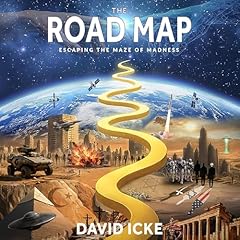
The Simulation Hypothesis
An MIT Computer Scientist Shows Why AI, Quantum Physics, and Eastern Mystics All Agree We Are in a Video Game
No se pudo agregar al carrito
Solo puedes tener X títulos en el carrito para realizar el pago.
Add to Cart failed.
Por favor prueba de nuevo más tarde
Error al Agregar a Lista de Deseos.
Por favor prueba de nuevo más tarde
Error al eliminar de la lista de deseos.
Por favor prueba de nuevo más tarde
Error al añadir a tu biblioteca
Por favor intenta de nuevo
Error al seguir el podcast
Intenta nuevamente
Error al dejar de seguir el podcast
Intenta nuevamente
$0.00 por los primeros 30 días
POR TIEMPO LIMITADO
Obtén 3 meses por US$0.99 al mes
La oferta termina el 29 de enero de 2026 11:59pm PT.
 Exclusivo para miembros Prime: ¿Nuevo en Audible? Obtén 2 audiolibros gratis con tu prueba.
Exclusivo para miembros Prime: ¿Nuevo en Audible? Obtén 2 audiolibros gratis con tu prueba.
Solo $0.99 al mes durante los primeros 3 meses de Audible Premium Plus.
1 bestseller o nuevo lanzamiento al mes, tuyo para siempre.
Escucha todo lo que quieras de entre miles de audiolibros, podcasts y Originals incluidos.
Se renueva automáticamente por US$14.95 al mes después de 3 meses. Cancela en cualquier momento.
Elige 1 audiolibro al mes de nuestra inigualable colección.
Acceso ilimitado a nuestro catálogo de más de 150,000 audiolibros y podcasts.
Accede a ofertas y descuentos exclusivos.
Premium Plus se renueva automáticamente por $14.95 al mes después de 30 días. Cancela en cualquier momento.
Compra ahora por $20.70
-
Narrado por:
-
Ray Greenley
-
Rizwan Virk
-
De:
-
Rizwan Virk
Are we living in a simulation? MIT computer scientist Rizwan Virk draws from research and concepts from computer science, artificial intelligence, video games, quantum physics, and ancient mystics to explain why we may be living inside a simulated reality like the Matrix.
Simulation theory explains some of the biggest mysteries of quantum and relativistic physics, such as quantum indeterminacy, parallel universes, and the integral nature of the speed of light, using information and computation.
Virk shows how the evolution of our video games, including virtual reality, augmented reality, artificial intelligence, and quantum computing, will lead us to a technological singularity. We will reach the simulation point, where we can develop all-encompassing virtual worlds like the OASIS in Ready Player One or The Matrix—and in fact we are already likely inside such a simulation.
While the idea sounds like science fiction, many scientists, engineers, and professors have given the simulation hypothesis serious consideration, including Elon Musk, Neil deGrasse Tyson, and Nick Bostrom. But the simulation hypothesis is not just a modern idea. Philosophers of all traditions have long contended that we are living in some kind of “illusion” and that there are other realities that we can access with our minds.
The Simulation Hypothesis is the definitive book on simulation theory and is now completely updated to reflect the latest developments in artificial intelligence and virtual reality.
Whether you are a computer scientist, a fan of science fiction like the Matrix movies, a video game enthusiast, a spiritual seeker, or simply a fan of mind-bending thought experiments, you will never look at the world the same way again.
* This audiobook edition includes a downloadable PDF of visual elements from the book.
Los oyentes también disfrutaron:




















Reseñas de la Crítica
“This book is a must read for anyone willing to consider the plausible possibility that AI generates a simulated world within the larger simulation which we call reality.”
—Avi Loeb, bestselling author of Extraterrestrial and Interstellar, professor and director of Harvard’s Institute for Theory and Computation and head of the Galileo Project, Harvard University
“Forget science fiction! Prepare to have your mind blown by Rizwan Virk's The Simulation Hypothesis. From quantum mechanics to VR/AR, Virk connects the dots in a way that's both accessible and utterly convincing. If you've ever wondered if we're living in the Matrix, this is your must-read guide to the true nature of reality.”
—Chen Qiufan, author of Waste Tide and co-author of AI 2041: Ten Visions for Our Future
“You take the red pill and you keep on reading and Rizwan Virk, computer scientist and author of The Simulation Hypothesis, will show you how deep the rabbit hole goes.”
—BBC Science Focus
“I have learned that we live, teach, learn, and love in a virtual world. In this book, Riz Virk combines the mind of a scientist with the heart of a mystic, using video games to explain the virtual reality that we live in.”
—Dannion Brinkley, bestselling author of Saved by the Light
“A stunning reappraisal of what it means to be human in an infinite universe.”
—Jacques Vallée, venture capitalist, author of Forbidden Science, former scientist for NASA and Stanford Research Institute
“Rizwan Virk’s book The Simulation Hypothesis is one of the few works that could convince me that I probably live in a simulated universe.”
—Diana Walsh Pasulka, professor of philosophy and religion, University of North Carolina Wilmington, author of American Cosmic: UFOS, Religion, Technology
“… This idea that we’re all characters in an advanced civilization’s video game is, well, kind of awesome…”
—Vox.com
—Avi Loeb, bestselling author of Extraterrestrial and Interstellar, professor and director of Harvard’s Institute for Theory and Computation and head of the Galileo Project, Harvard University
“Forget science fiction! Prepare to have your mind blown by Rizwan Virk's The Simulation Hypothesis. From quantum mechanics to VR/AR, Virk connects the dots in a way that's both accessible and utterly convincing. If you've ever wondered if we're living in the Matrix, this is your must-read guide to the true nature of reality.”
—Chen Qiufan, author of Waste Tide and co-author of AI 2041: Ten Visions for Our Future
“You take the red pill and you keep on reading and Rizwan Virk, computer scientist and author of The Simulation Hypothesis, will show you how deep the rabbit hole goes.”
—BBC Science Focus
“I have learned that we live, teach, learn, and love in a virtual world. In this book, Riz Virk combines the mind of a scientist with the heart of a mystic, using video games to explain the virtual reality that we live in.”
—Dannion Brinkley, bestselling author of Saved by the Light
“A stunning reappraisal of what it means to be human in an infinite universe.”
—Jacques Vallée, venture capitalist, author of Forbidden Science, former scientist for NASA and Stanford Research Institute
“Rizwan Virk’s book The Simulation Hypothesis is one of the few works that could convince me that I probably live in a simulated universe.”
—Diana Walsh Pasulka, professor of philosophy and religion, University of North Carolina Wilmington, author of American Cosmic: UFOS, Religion, Technology
“… This idea that we’re all characters in an advanced civilization’s video game is, well, kind of awesome…”
—Vox.com
Las personas que vieron esto también vieron:


















The book discusses a lot of ideas and concepts and references that I have read or heard in other places, but I have never seen a single work (book, paper, podcase, talk, etc.) that connected so many of them in this way. I've been stitching a lot of this stuff together in my own mind, and in discussions with friends, for years. And, there were some ideas, or connections, or perspectives that were new for me. This will be a good reference, and something that I will be recommending so that we level set before we start some future discussions and debates.
The style and perspective of the author might not be for everyone. It hits for me. I'm a gamer and life long computer nerd. I enjoyed the high level history of computer gaming, and general computer science and technology. It is not a text book on those subjects, but there is enough background there to help someone understand the past, present and future roadmap of computer technology that will lead to some future state where we can realistically simulate worlds. It is a nice overview of what we have already accomplished, for those who may not know or may have forgotten, and how far it has come very quickly. And then to realize that this technology is only in its infancy, and at the current pace, it is rather mind boggling to think about what it will be like in 10, 50, 100 years or more (if we aren't all paperclips by then). I haven't seen anyone else tie together all of the necessary pieces for the technology roadmap for the "simulation point," and especially from a game design perspective. I'm sure that is half the reason why I enjoyed it so much, I already had a propensity to thinking about it that way. Nothing like the sweet feeling of cognitive consonance you get from confirmation bias.
One review points out that naming dropping Elon Musk didn't age well. I agree with that point, and wonder if that was included due to name recognition and for marketing purposes. There was a time when a lot of folks would have given Mr. Musk the benefit of the doubt on many general ideas related to science and technology. He does have more access to qualified people than the average person, and for a good part of his career, he seemed to be focused on using his wealth to push humanity forward in areas of science and technology. I doubt Musk has contributed any original thinking or work on these ideas. He's probably had opportunities to talk to a lot of people have done so. At one time, folks might have accepted his second hand thoughts and opinions as useful or interesting. But now referencing him is going to raise flags of appeal to authority for some, and in some cases damage credibility for your arguments. For me, it didn't take away from the gist of the book. It did make me think about the dangers of putting putting too much credence into the words of anyone, public figure or not, based on their perceived level of credibility at any point in time. There is a time I would have glossed over it myself, and now I'm like, "oh, boy, I wonder if he was an Elon fan in the past and so focused on writing the book that he wasn't reading or watching the news? Or, just not reading the room?"
Regardless, if you are reading this, the book's thesis doesn't hinge on the Musk references one way or the other, nor in my opinion any other weaknesses supporting citations, or any flaws in any technical arguments, etc. Most of these ideas and concepts are out there being discussed by people all over the world already and have been for some time. The author had done a good job of compiling and connecting many ideas from many domains, and that is what I like about it. I've been doing that in my own head for some time, and it filled some gaps, I learned a few new ideas or ways to explains ones I already knew, it gives me something to reference later and something to recommend to others who I wanted to share this view of the topic with.
An additional perspective
Se ha producido un error. Vuelve a intentarlo dentro de unos minutos.
Best book on simulation theory.
Se ha producido un error. Vuelve a intentarlo dentro de unos minutos.
Very well laid out
Se ha producido un error. Vuelve a intentarlo dentro de unos minutos.
Balances his viewpoints.
Se ha producido un error. Vuelve a intentarlo dentro de unos minutos.
A basic overview of random things, like 3d printers
Se ha producido un error. Vuelve a intentarlo dentro de unos minutos.


